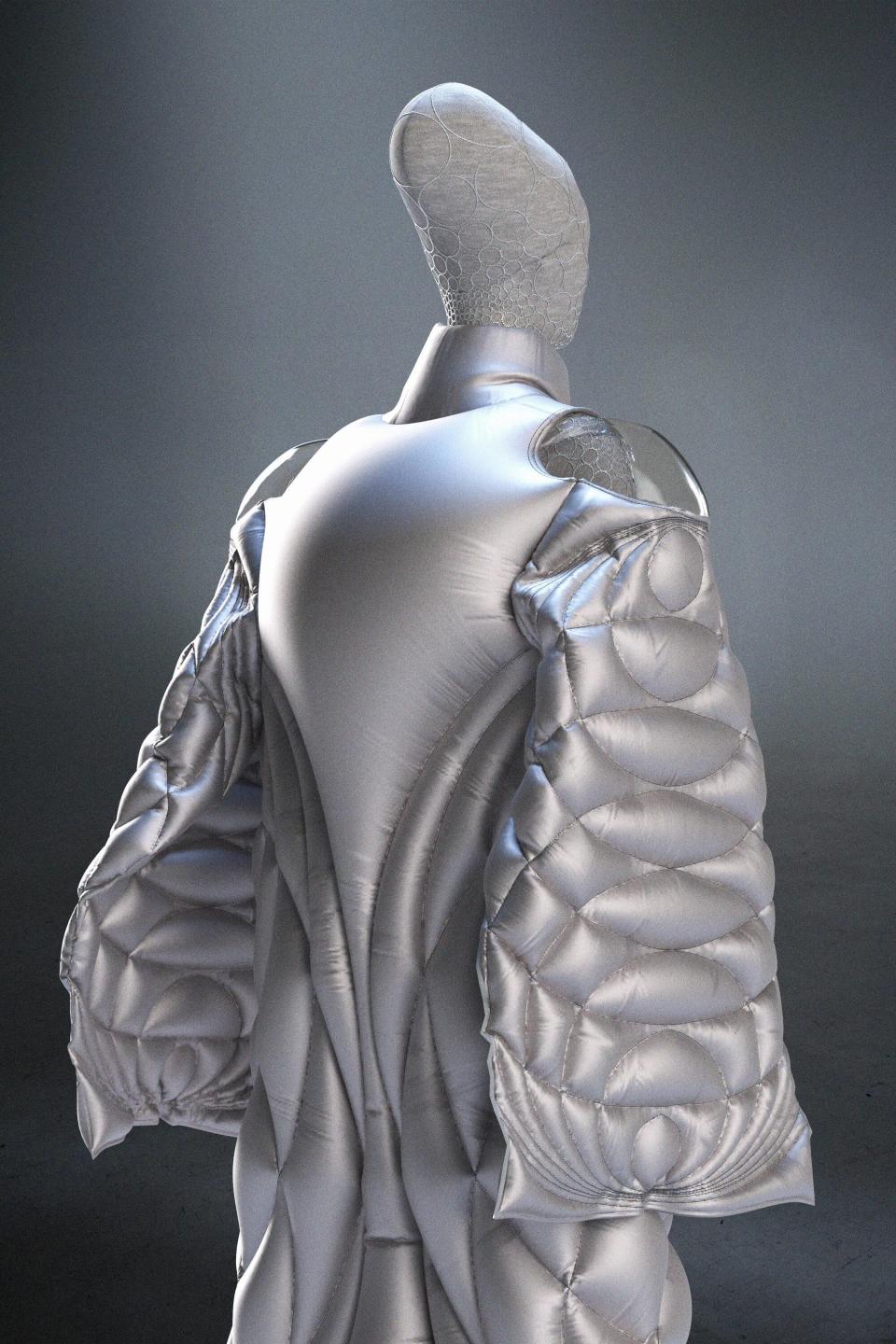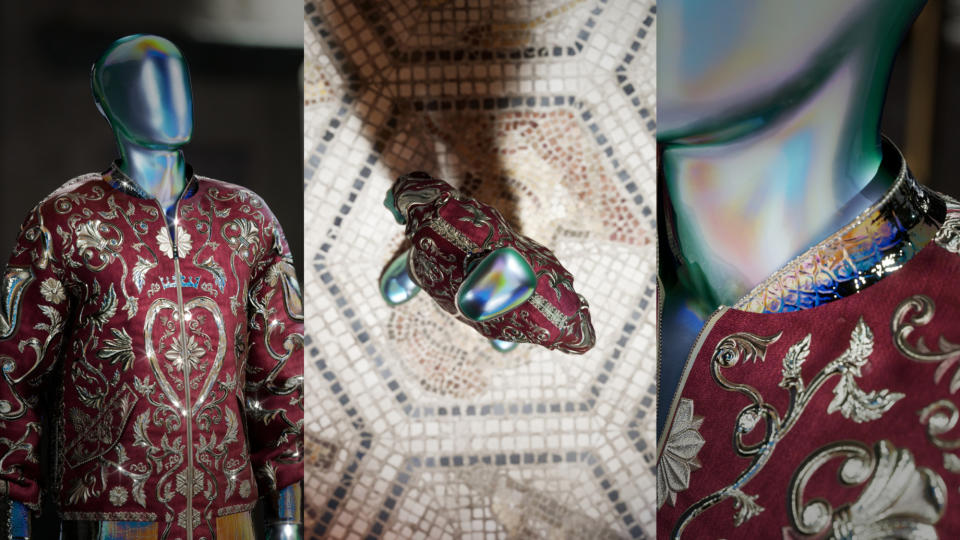The buzz around the metaverse may have died down, but the idea of virtual fashion hasn’t. It’s now ready to take the next step by diving deeper into offerings that are both digital and physical.
A new nonprofit organization, the Digital Fashion Designers’ Council, wants to not only keep phygital alive, but also help it thrive. To prove it, the affiliated group is hosting an event series with Diesel and other notable brands.
More from WWD
The DFDC launches on Tuesday with the mission to “integrate digital fashion into the traditional fashion ecosystem,” the association said.
That’s easier said than done.
Despite the push by numerous virtual world developers for interoperability between platforms, there are still no universal standards for virtual fashion, let alone phygital fashion experiences. Projects vary, as do technical requirements from one environment to another.
This means a brand has to create multiple formats to provide a virtual look that works in different contexts and on different platforms. Or at least they did. Now, DFDC is introducing a tool to streamline the effort.
DFDC’s new Reality Spectrum Matrix is designed to do the heavy engineering lifting, so brands can focus on the product and the experience.


It’s part of a broader and ambitious approach that extends beyond gaming or virtual worlds to social media, augmented reality and more, and across devices from phones to mixed reality headsets, whether through an app or a web browser.
“We see tremendous power in bridging the digital context in which consumers spend their time with the physical world of brands and the physical fashion system,” David Cash, founder and CEO of DFDC, told WWD.[It’s about] just do a little better job of connecting those dots [to] “actually provide connectivity, rather than just suggesting it.”
To prove the concept, the group, which had already assembled some of the biggest names in virtual fashion and blockchain, created an event series featuring the work of some of the world’s most famous fashion houses.
Connecting across all types of fashion
For the premiere of the Fashion Week Connect series, DFDC has curated a programme featuring a range of phygital experiences around the world, both real and digital, kicking off in September.
The global Digital Fashion Film Festival, a partnership with ShowStudio led by Nick Knight and his team, will showcase digital fashion worldwide, both online and IRL, with films starring celebrities such as Charlie XCX and Naomi Campbell and fashions from Balenciaga, Mugler, Loewe, Bottega Veneta and more.
Also on the agenda is Diesel’s Metamorph project, featuring his virtual reality-based Vert watches, and an interactive metaverse experience created by Artificial Rome.
A veritable VIP reception in Los Angeles, co-hosted by Red DAO and DFDC, brings Dolce & Gabbana’s Collezione Genesi to a physical location. The 2021 collection, hailed as the world’s first luxury phygital offerings, took the form of NFTs with physical counterparts and sold for around $6 million, including Red DAO’s purchase of jackets and the “Doge Crown,” among other items on display at the event.


DFDC will also be present in Paris, where it will help present Fabrix Digital Fashion Takeover as part of Paris Fashion Week at the Palais de Tokyo. Supported by the Fédération de la Haute Couture et de la Mode, the activation will feature Hong Kong-based designers Wilsonkaki, Ponder.er and others.
In London, the group will support Digital Fashion Week at Epic Games Studios and other exclusive VIP events worldwide, before heading to Singapore. As title sponsor and lead innovation partner for Next in Vogue, it will offer AR, game worlds, holograms and other experiences.
Fashion Week Connect and the DFDC will also play a role in pop-up events during fashion weeks in New York, London and Paris.
Under the theme of interoperability, supported platforms for the event series include: social media apps like Instagram, TikTok, and Snapchat; games like Fortnite and Roblox; metaverses Spatial and Decentraland; and devices from phones and desktops to Meta Quest headsets.
The effort seems enormous. To pull it off, Cash has assembled an all-star roster from the virtual fashion ranks for his board and operations team.
The list includes fashion photographer, filmmaker, and self-proclaimed “image maker” Knight; Megan Kaspar, managing director at FirstLight and founder of Red DAO; Antoni Tudisco, a 3D and digital fashion artist who has worked with LVMH Moët Hennessy Louis Vuitton, Maison Margiela, Moncler, Balenciaga, and others; Bettina Von Schlippe, publisher of Vogue Singapore; Marjorie Hernandez, co-founder of Web 3.0 fashion marketplace Demat and creative blockchain platform Lukso; Daria Shapovalova and Natalia Modenova of DressX; Dani Loftus, founder of code-based couture platform Draup and digital fashion influencer @thisoutfitdoesnotexist; Leanne Elliott Young of the Institute of Digital Fashion and Gmoney of 9DCC.
Other groups involved include Threedium, Karta, Beyond Studio, MAD Global and FFFaceme.
Interestingly, DFDC is also in talks with prominent creative and executive leaders from the established fashion industry. Cash declined to comment on their identities at this time, but an official announcement is expected at some point.


A new vision on phygital technology
When calm has returned, the DFDC hopes that fashion brands will return home with a clear picture of the possibilities of the interaction between digital and physical.
The events embody her mission. But what facilitates her vision is the technology, and that will linger long after the final activation in this series.
This brings the focus back to the group’s Reality Spectrum Matrix.
As a framework, it’s a clever workaround to solve the interoperability problem. With RSM, brands don’t have to create multiple versions of a given asset in different formats. The technology does the work, or as Cash explained, “polygon remapping.” Essentially, the tool takes care of the coding requirements so brands can focus on the product, the experience, and the physicality.
Additionally, the DFDC is working on an “API that we can plug into anything,” he added. “So we can plug this directly into a mobile app, into a website — if we want to be technical about it, into any React-enabled context, from a game world to a website or even a web page.” React is an open-source tool developed by Meta for building interfaces.
In addition, there is a structure for awarding and registering points, allowing consumers to earn rewards and increase their loyalty in a gamified scenario.
These tools could also support virtual fashion NFTs. While non-fungible tokens may not make the headlines they did when Dolce & Gabbana’s multimillion-dollar Collezione Genesi took the industry by storm three years ago, the fashion world hasn’t declared it over yet.


Despite the twists and turns in investment and value, or the influence of legislation and politics, these and other “on-chain” blockchain efforts are still having an impact on brands, Kaspar said.
“Look at brands like Louis Vuitton,” she said, referring to the fashion house’s continued launch of on-chain products — including its latest phygital NFT release of a leather varsity jacket in April.
Kaspar, who serves as a principal advisor and board member of DFDC, also worked with the luxury fashion house on the Via NFT program. “They know how valuable it is in the long run for their products to be on-chain,” she explained. “I also think that with the regulations that the EU is putting in place with smart tags, brands are going to want to connect these smart tags, NFC chips that they’re embedding in their products, on-chain so that you can access that metadata — and then seamlessly connect that to a more comprehensive digital counterpart of that asset, whether it’s a 3D asset, a wearable, a filter.”
There is a push to regulate, but it’s a bit scattered across governing bodies. But with the DFDC, brands can join the conversation and have a hand in shaping what the future of this ecosystem looks like, Kaspar added.
“To share from my personal experience with the Via initiative: [consumer] “Via members get to vote… on what we want the brand to produce, which is pretty unheard of,” she continued. “Outside of that, I’ve never seen a high-end luxury brand allow its consumers to do that.
“So I think what David is doing with DFDC and the RSM tool is really going to be a much easier way for these brands to integrate these tools and aspects, which will allow them to strengthen their relationship with the consumer in the long term.”
The Best of WWD